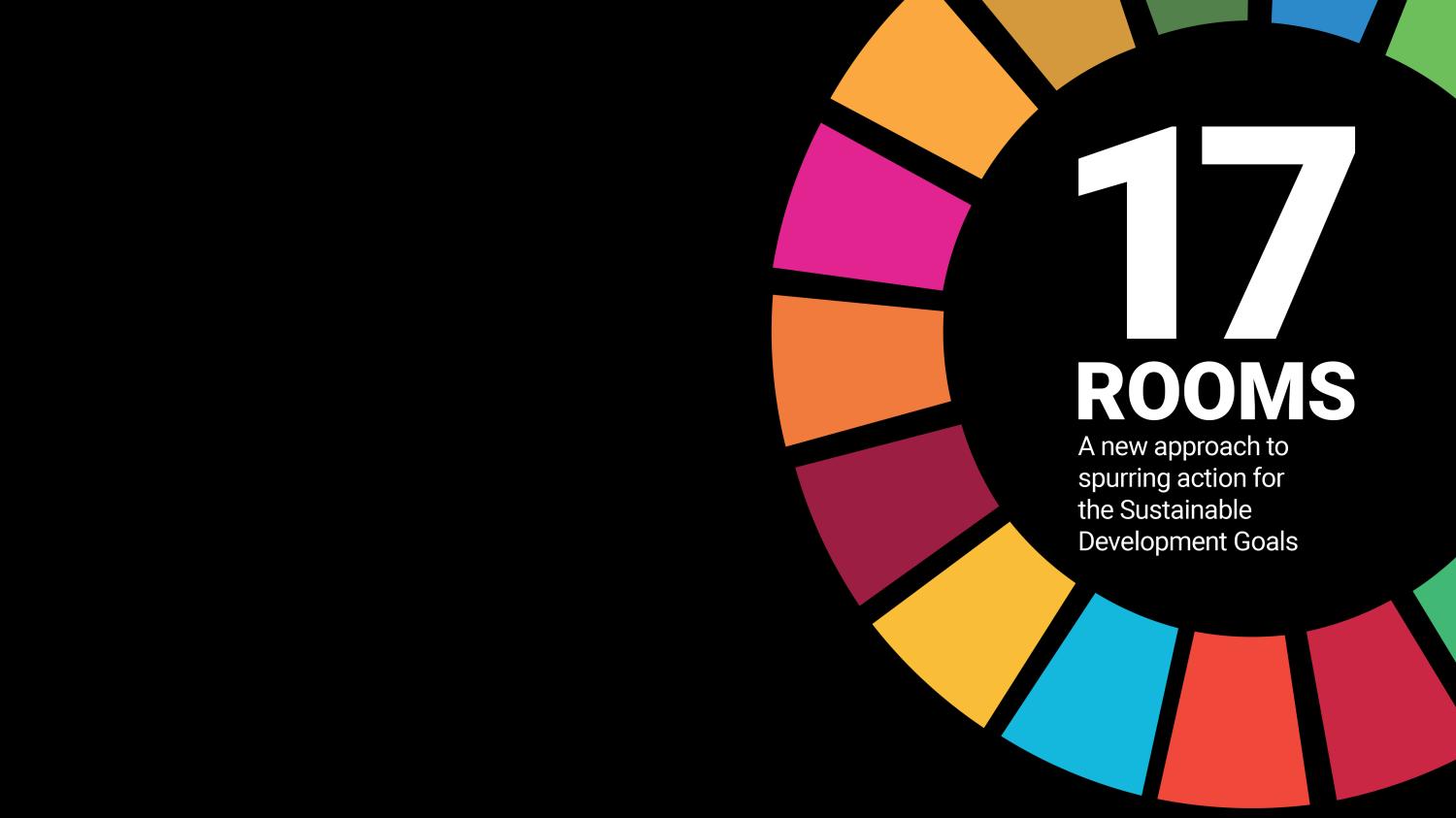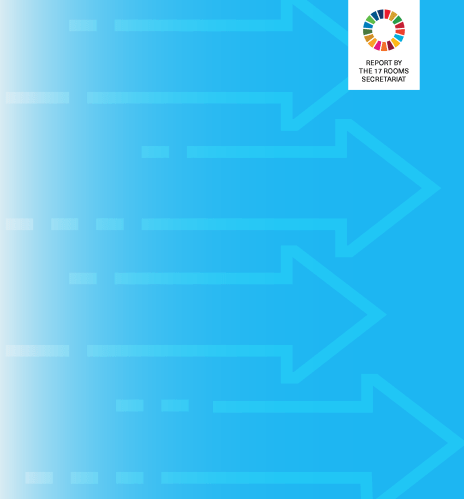FOReWoRD
This report describes a new approach to stimulating cooperative action toward the Sustainable Development Goals. As an experimental method for SDG convening and problem-solving, 17 Rooms aims to surface practical next steps within each goal while also stimulating productive connections across all goals. In its early incarnations, 17 Rooms has proven useful at multiple scales of action, ranging from local communities to the global level. The approach can be just as effective for experts immersed in U.N. frameworks as for community practitioners who operate free of international policy jargon. This report takes stock of the 17 Rooms initiative as of early 2021 and captures emerging insights for a broader community of readers who might be interested in collaborating moving forward.
Executive summary
A core motivation for establishing the Sustainable Development Goals (SDGs) in 2015 was to break from business-as-usual. As the past year’s COVID-19 pandemic and ensuing global crises have only underscored, a more just, sustainable, and inclusive world requires new forms of action, technology, and partnership at all levels–spanning business, science, government, and civil society. The need for innovation extends to the process of problem-solving itself. Every country and local community needs its own efforts to work through multi-stakeholder debates and priorities. Specialist constituencies require opportunities to gather and hash out technical issues in depth. Spaces for policymaking and deliberation need not be rigidly formal. Many problems simply need creative environments for people to float ideas and explore cooperation on next steps, away from the pressures of microphones and public spotlights. In September 2018, the Brookings Institution and The Rockefeller Foundation convened the first experimental 17 Rooms session, on the eve of the U.N. General Assembly, to spur progress within each SDG and bridge insights across goals. After only a few years of quick evolution, the initiative has tapped into widespread interest in new approaches to advancing the SDGs, through both a global flagship process and a widely-accessible offshoot dubbed “17 Rooms-X” (or “17 Rooms-U” for universities).
What is 17 Rooms?
17 Rooms offers an efficient way of convening natural allies, ideally promoting enough familiarity to enable collaboration and enough diversity to spark new ideas and pathways to action. Each Room is a working group focused on one of the 17 respective SDGs. Early years of experimentation have surfaced some core design principles:
- All SDGs get a seat at the table: Each 17 Rooms process respects unique priorities within goals while recognizing interdependencies between goals.
- Take a next step, not the perfect step: Rooms focus on actionable ideas within an SDG that are “big enough to matter and small enough to get done” over a 12-18 month horizon.
- Engage in conversations, not presentations: Convenings celebrate informal discussions among peers, with institutional agendas at the door, focusing on what could be best for an issue, not for an organization.
Creating value
When combined, these design principles empower participants to:
- Advance concrete actions: All Rooms are tasked to consider what is needed and what participants can do over the following 12-18 months. Outputs might range from influencing a research initiative to creating an analytical tool, a communications campaign, a policy shift, a strategic plan, or even a new entity.
- Form novel insights: When participants working on common problems share their perspectives from different backgrounds, organizations, and sectors, unique forms of group learning occur, both within and across Rooms.
- Foster pragmatic communities: A collaborative quest for action grounded in recognition of diverse outlooks appears to generate a shared sense of energy and opportunity.
17 Rooms flagship
The highly curated annual 17 Rooms flagship focuses on global-scale SDG challenges. It has formed a “tip of the arrow” advancing the overall thinking of what the methods can be and providing lessons to inform community-level syndication efforts. As of 2020, the flagship includes five distinct phases: (1) organizers identify and work with moderators to select a substantive focus within an SDG and suitable participant composition for each Room; (2) each Room convenes to share perspectives and develop a draft document that outlines actionable ideas to advance progress within their SDG; (3) Rooms learn about other Rooms’ priorities, share feedback, and explore common areas of interest; (4) each Room presents its key insights in a lightning round series of presentations; (5) Rooms chart their own course to impact, with support from the secretariat team, which also identifies crosscutting insights and discussions that generated the greatest enthusiasm and opportunities for follow-up. An internal learning process concurrently enables the initiative to keep updating itself every year.
17 Rooms-X
17 Rooms has also proven valuable at local levels, as a tool for thinking practically about the SDGs at any scale of community or geography. Remarkably, a range of 17 Rooms offshoot experiments have already taken place, with minimal guidance from the Brookings Institution or The Rockefeller Foundation. Universities have so far been the first movers in piloting their own “17 Rooms-U” efforts, while a variety of municipalities, companies, and other organizations have also expressed interest in convening their own processes in the near future.
These experiments have shown a variety of ways in which a 17 Rooms-X process can:
- unlock information regarding the diverse SDG interests and activities that might already be embedded across a community,
- leverage the SDGs as a tool for common conversations across groups that might otherwise struggle to connect across professional vocabularies and organizational reference points, and
- offer a method for spurring cooperation among people who might not otherwise have the chance to do so.
17 Rooms-X offers a device for stimulating bottom-up awareness and cooperation across the many perspectives and interests that are all pertinent to sustainable development, while also creating a bridge between local grassroots activities and tradition-al institutional SDG stakeholders.
What next?
In 2021, the 17 Rooms initiative will keep updating its methods and codifying insights through a new cycle of experimentation. The annual global flagship—“version 4.0”—will continue as a virtual international process until COVID-19 is better under control and in-person convenings are again safe. Meanwhile, the secretariat will provide more systematic support to offshoot efforts, including the launch of a beta toolkit and community of practice, so that partners can more easily share learnings and insights across their own “17 Rooms-X” processes.
If you are interested in joining the 17 Rooms community of discovery, design, and implementation—whether by hosting a 17 Rooms-X process or something else—please email the 17 Rooms secretariat at [email protected].




